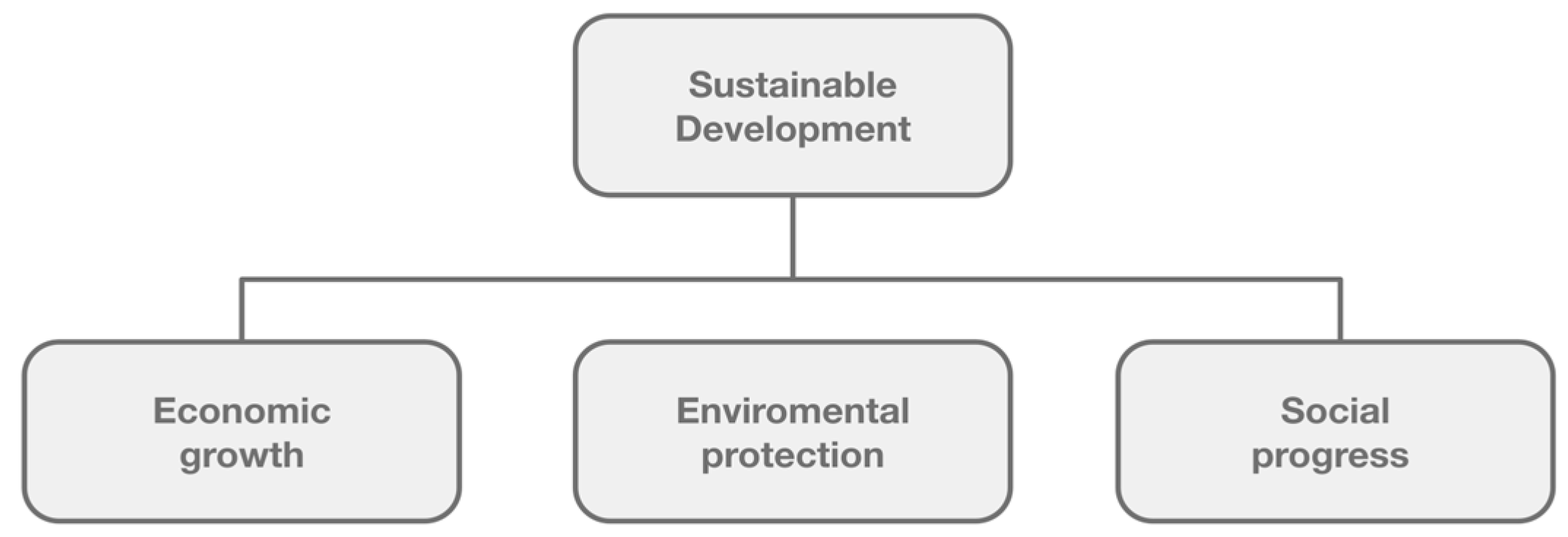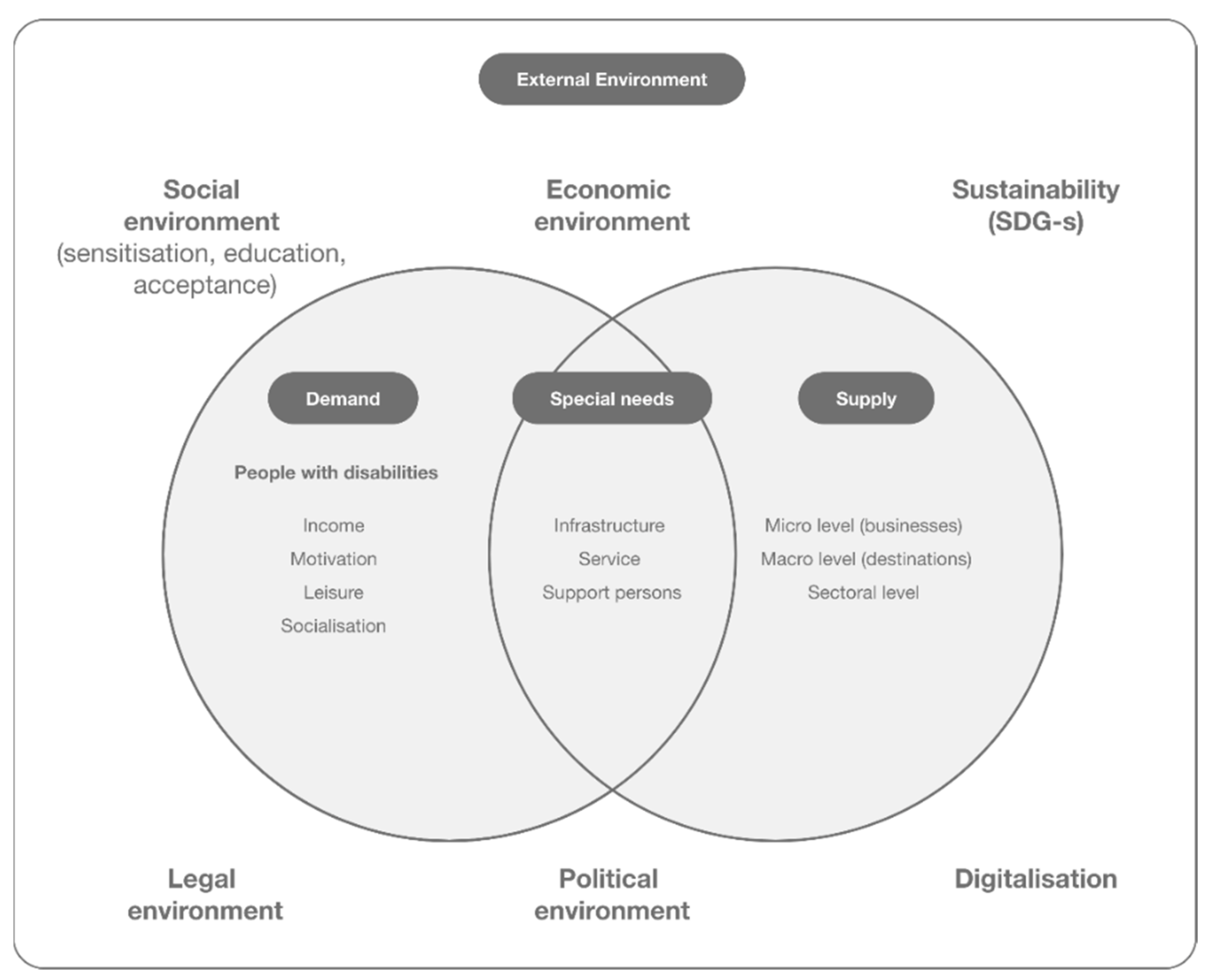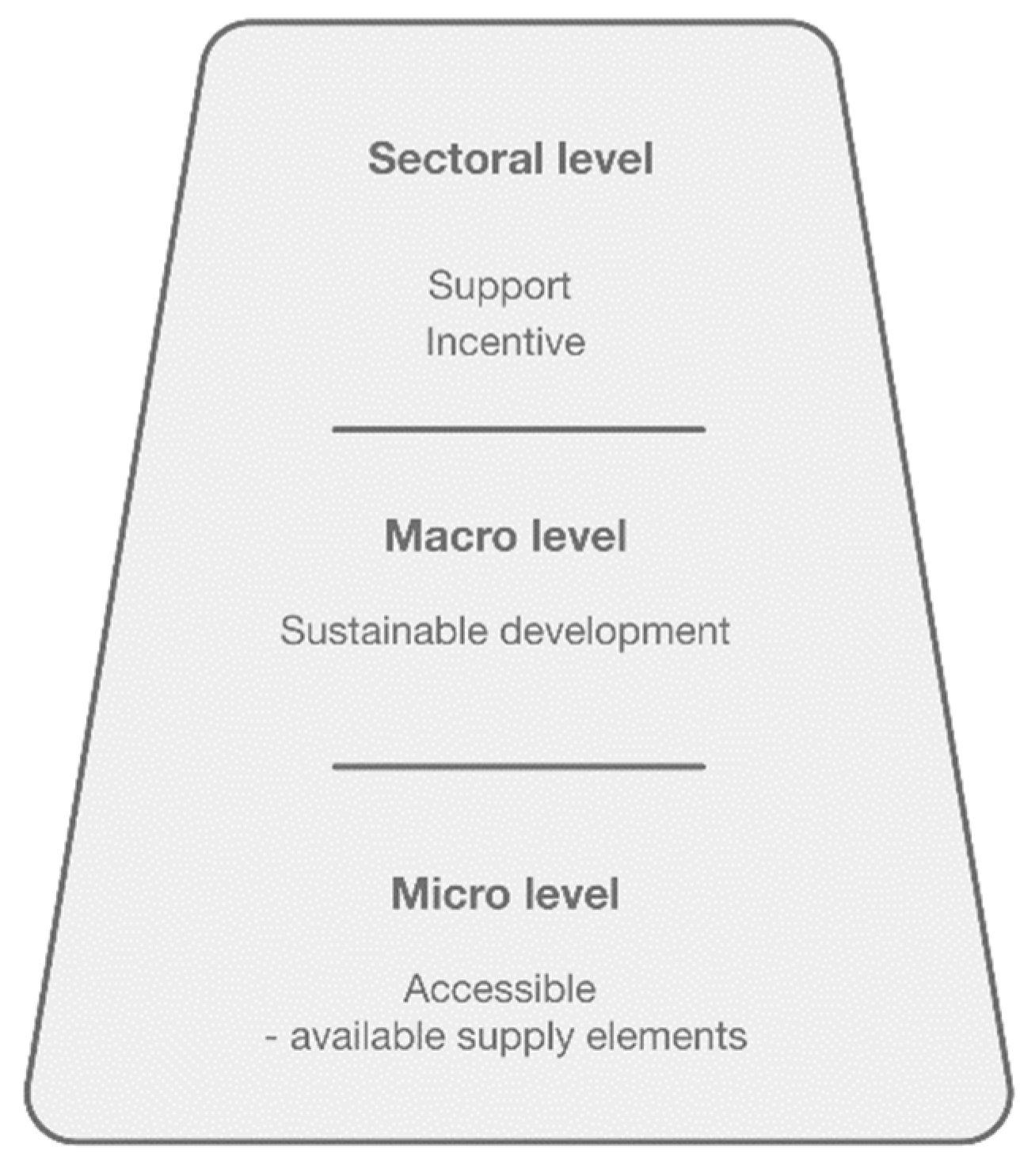A Theoretical Model for the Implementation of Social Sustainability in the Synthesis of Tourism, Disability Studies, and Special-Needs Education
Abstract
:1. Introduction
2. Theoretical Overview
2.1. Sustainability and the Sustainable Development Goals
2.1.1. Disability-Related Sustainable Development Goals
2.1.2. Tourism-Related Sustainable Development Goals
2.1.3. Disability and Sustainable Tourism
- Job creation in the tourism sector can increase employment opportunities for people with disabilities;
- Tools for monitoring sustainable tourism can help to measure the impact on people with disabilities, both as tourism workers and as tourists;
- Cities are important tourist destinations for people with disabilities as they generally offer more accessible tourism opportunities than rural tourism [19].
2.2. People with Disabilities, Disability Studies, Special-Needs Education, Psychology of Special Needs
2.2.1. The Disabled Person
2.2.2. Disability Studies
2.2.3. Special-Needs Education and the Psychology of Special Needs
3. Materials and Methods
4. Discussion
4.1. Demand
4.1.1. Discretionary Income
4.1.2. Motivation
4.1.3. Leisure
4.1.4. Socialisation
4.2. Supply
- The tourism destination management organisation must set out its measures for the reception of disabled people in a strategy document, which includes the objectives and measures for accessible and available tourism. This can also help to ensure accurate and credible communication of accessible services;
- The destination may also consider accessibility in terms of the urban and architectural environment. Providing parking, sidewalks, spaces, corridors within buildings, ramps, lifts, and proper design of access to wash facilities for people with disabilities will help to promote accessibility in tourism. Alternative modes of communication and signs (sign language, Braille, easy-to-understand communication) will make the reception area and its services more accessible;
- For tourism service providers, such as hotels, restaurants, and event venues, the provision of accessible rooms, customer services, and the accommodation of assistants (e.g., guide dogs) is essential. Special care should be taken to provide accessible design (wash facilities) and equipment (e.g., menus) for the halls. Accessible conference rooms, equipment (e.g., voice induction loop), and services are also important factors;
- Provide accessibility, information materials, and equipment, as well as training for customer service staff for tourist attractions, cultural events, and shopping in natural or cultural settings.
4.3. Specific Needs
4.4. External Environmental Factors
4.4.1. Social Environment
4.4.2. Economic Environment
- Accessible tourism generated €786 billion, including indirect and induced contributions;
- Accessible tourism generated a total economic contribution of €394 billion in terms of gross domestic product;
- A total of 8,711,000 people were employed in the region to generate this economic output;
- On average, 2.2 escorts travel with disabled persons;
- Persons with disabilities and their companions contributed a total of €1,109,740 million to the gross domestic product.
4.4.3. Sustainability
- Through employment and entrepreneurship within the tourism sector;
- As consumers and users of tourism products and services.
- Improving accessibility of public transport, spaces, and places for people with disabilities;
- Promoting the participation of persons with disabilities as economic operators and consumers in tourism [19].
4.4.4. Digitalisation
4.4.5. Political Environment
4.4.6. Legal Environment
5. Conclusions
Author Contributions
Funding
Institutional Review Board Statement
Informed Consent Statement
Data Availability Statement
Conflicts of Interest
References
- Happ, É. Fenntartható turizmus és felelősségvállalás. Gazdaság Társadalom 2014, 1, 90–101. [Google Scholar] [CrossRef]
- Weaver, D. Sustainable Tourism, 1st ed.; Routledge: London, UK, 2005. [Google Scholar] [CrossRef]
- Krippendorf, J. Towards new tourism policies: The importance of environmental and sociocultural factors. Tour. Manag. 1982, 3, 135–148. [Google Scholar] [CrossRef]
- Goodwin, H. (Ed.) Chapter 1 What is Responsible Tourism; Goodfellow Publishers: Oxford, UK, 2016. [Google Scholar] [CrossRef]
- Hultsman, J. Just tourism: An ethical framework. Ann. Tour. Res. 1995, 22, 553–567. [Google Scholar] [CrossRef]
- Dangi, T.B. Exploring the Intersections of Emotional Solidarity and Ethic of Care: An Analysis of Their Synergistic Contributions to Sustainable Community Tourism Development. Sustainability 2018, 10, 2713. [Google Scholar] [CrossRef] [Green Version]
- Tribe, J. Education for ethical tourism action. J. Sustain. Tour. 2002, 10, 309–324. [Google Scholar] [CrossRef]
- Biddulph, R.; Scheyvens, R. Introducing inclusive tourism. Tour. Geogr. 2018, 20, 583–588. [Google Scholar] [CrossRef] [Green Version]
- Qiao, G.; Ding, L.; Zhang, L.; Yan, H. Accessible tourism: A bibliometric review (2008–2020). Tour. Rev. 2021. Epub ahead of printing. [Google Scholar] [CrossRef]
- Magyar Turisztikai Ügynökség. Akadálymentes Turizmus. Available online: https://mtu.gov.hu/cikkek/akadalymentes-turizmus (accessed on 21 January 2022).
- Sustainable Development Goals, United Nations. Available online: https://sdgs.un.org/goals (accessed on 10 November 2021).
- World Commission on Environment and Development. From One Earth to One World: An Overview; Oxford University Press: Oxford, UK, 1987; p. 8. [Google Scholar]
- Brundtland, G. Our Common Future—Call for Action. Environ. Conserv. 1987, 14, 291–294. [Google Scholar] [CrossRef]
- Spreckley, F. Social Audit—A Management Tool for Co-Operative Working; Beechwood College Ltd.: Leeds, UK, 1981. [Google Scholar]
- Stoddard, J.E.; Pollard, C.E.; Evans, M.R. The Triple Bottom Line: A Framework for Sustainable Tourism Development. Int. J. Hosp. Tour. Adm. 2012, 13, 233–258. [Google Scholar] [CrossRef]
- Transforming Our World. The 2030 Agenda for Sustainable Development, United Nations. Available online: https://www.un.org/ga/search/view_doc.asp?symbol=A/RES/70/1&Lang=E (accessed on 21 January 2022).
- International Tourism Highlights 2020 Edition. Available online: https://www.e-unwto.org/doi/pdf/10.18111/9789284422456 (accessed on 21 January 2022).
- Tourism In The 2030 AGENDA. Available online: https://www.unwto.org/tourism-in-2030-agenda (accessed on 19 January 2022).
- Policy Guidelines for Inclusive Sustainable Development Goals. Available online: https://www.ohchr.org/Documents/Issues/Disability/SDG-CRPD-Resource/policy-guideline-sdg4-education.pdf (accessed on 10 November 2021).
- Darcy, S. Setting A Research Agenda for Accessible Tourism; Sustainable Tourism Cooperative Research Centre: Gold Coast, Australia, 2006; pp. 1–36. [Google Scholar]
- Darcy, S.; Dickson, T.J. A whole-of-life approach to tourism: The case for accessible tourism, experiences. J. Hosp. Tour. Manag. 2009, 16, 32–44. [Google Scholar] [CrossRef] [Green Version]
- Darcy, S.; Pegg, S. Towards strategic intent: Perceptions of disability service provision amongst hotel accommodation managers. Int. J. Hosp. Manag. 2011, 30, 468–476. [Google Scholar] [CrossRef] [Green Version]
- Yau, M.K.-S.; McKercher, B.; Packer, T.L. Traveling with a disability: More than an access issue. Ann. Tour. Res. 2004, 31, 946–960. [Google Scholar] [CrossRef]
- Pagán, R. Time allocation in tourism for people with disabilities. Ann. Tour. Res. 2012, 39, 1514–1537. [Google Scholar] [CrossRef]
- Scheyvens, R.; Biddulph, R. Inclusive tourism development. Tour. Geogr. 2017, 20, 589–609. [Google Scholar] [CrossRef]
- Jurado Almonte, J.M. El turismo accesible en Andalucía. Un producto turístico emergente. Rev. Estud. Andal. 2014, 31, 1–34. [Google Scholar] [CrossRef]
- Castro, J.E. Las Facilidades Turísticas del Sector Hotelero, y su Contribución al Turismo Inclusivo del Cantón Ambato Provincia de Tungurahua. Available online: https://repositorio.uta.edu.ec/jspui/handle/123456789/25181 (accessed on 22 November 2021).
- Accessible Tourism. Available online: https://www.unwto.org/accessibility (accessed on 30 November 2021).
- Centers for Disease Control and Prevention (CDC) Disability Impacts All of Us. Available online: https://www.cdc.gov/ncbddd/disabilityandhealth/infographic-disability-impacts-all.html (accessed on 30 November 2021).
- Eurostat. Disability Statistics. Available online: https://ec.europa.eu/eurostat/statistics-explained/index.php?title=Functional_and_activity_limitations_statistics&action=statexp-seat&lang=hu#Funkci.C3.B3k.C3.A9pess.C3.A9gi_.C3.A9s_tev.C3.A9kenys.C3.A9gi_korl.C3.A1tok (accessed on 10 December 2021).
- World Health Organization. International Functioning, Disability and Health (ICF). Available online: https://www.who.int/standards/classifications/international-classification-of-functioning-disability-and-health (accessed on 11 December 2021).
- ONCE. Madridi Nyilatkozat. Available online: http://www.msmke.hu/tamogat/madnyil.pdf (accessed on 30 November 2021).
- Goodley, D. Fogyatékosságtudomány. Interdiszciplináris Bevezető, 2nd ed.; ELTE Bárczi Gusztáv Gyógypedagógiai Kar: Budapest, Hungary, 2017. [Google Scholar]
- Hernádi, I.; Könczei, G.Y. Bevezetés. In A Felelet Kérdései Között. Fogyatékosságtudomány Magyarországon; Hernádi, I., Könczei, G., Eds.; ELTE Bárczi Gusztáv Gyógypedagógiai Kar: Budapest, Hungary, 2015; pp. 7–9. [Google Scholar]
- Convention on the Rights of Persons with Disabilities (CRPD), United Nations 2006. Available online: https://www.un.org/development/desa/disabilities/convention-on-the-rights-of-persons-with-disabilities.html (accessed on 10 November 2021).
- Sadan, E. Empowerment and Community Planning. Available online: http://www.mpow.org/elisheva_sadan_empowerment.pdf (accessed on 1 December 2021).
- Könczei, G.Y. A világban való közös létünk—és a támogatott döntéshozatal kihívása. Fogyatékosság Társadalom 2019, 2, 3–7. [Google Scholar] [CrossRef]
- Lányiné Engelmayer, Á. Gyógypedagógiai pszichológia. In Pedagógiai Lexikon; Báthory, Z., Falus, I., Eds.; Keraban: Budapest, Hungary, 1997; pp. 616–617. [Google Scholar]
- Lányiné Engelmayer, Á. Gyógypedagógiai pszichológia. In Alkalmazott Pszichológia; Bagdy, E., Klein, S., Eds.; Edge 2000 Kiadó: Budapest, Hungary, 2006; pp. 396–414. [Google Scholar]
- Zászkaliczky, P. A gyógypedagógia: A fogyatékosság tudománya. Fogyatékosság Társadalom 2014, 2, 73–85. [Google Scholar]
- Turizmus 2.0. Available online: https://mtu.gov.hu/documents/prod/NTS2030_Turizmus2.0-Strategia.pdf (accessed on 9 November 2021).
- Lengyel, M. A Turizmus Általános Elmélete; Kereskedelmi és Idegenforgalmi Továbbképző Kft.–Heller Farkas Gazdasági és Turisztikai Szolgáltatások Főiskolája: Budapest, Hungary, 2004. [Google Scholar]
- Michalkó, G. Turizmológia; Akadémia Kiadó: Budapest, Hungary, 2016. [Google Scholar] [CrossRef]
- Economic and Social Commission for Asia and the Pacific 2009: Takayama Declaration on the Development of Communities-for-All in Asia and the Pacific. Available online: https://www.accessibletourism.org/resources/takayama_declaration_top-e-fin_171209.pdf (accessed on 12 November 2021).
- World Tourism Organization. Recommendations on Accessible Tourism; UNWTO: Madrid, Spain, 2013. [Google Scholar] [CrossRef]
- Nigg, J.J.; Eichelberger, S. Sustainable Product Development for Accessible Tourism: Case Studies Demonstrating the Need for Stakeholder Collaboration. Sustainability 2021, 13, 11142. [Google Scholar] [CrossRef]
- Darcy, S.; McKercher, B.; Schweinsberg, S. From tourism and disability to accessible tourism: A perspective article. Tour. Rev. 2020, 75, 140–144. [Google Scholar] [CrossRef]
- Santamaria, G.L. Guía integral de turismo accesible e inclusivo del cantón Baños de Agua Santa—Ecuador. Available online: https://1library.co/document/yd29kxlq-guia-integral-turismo-accesible-inclusivo-canton-banos-ecuador.html (accessed on 22 November 2021).
- Kastenholz, E. Contributions of tourism to social inclusion of persons with disability. Disabil. Soc. 2015, 30, 1259–1281. [Google Scholar] [CrossRef]
- Gillovic, B.; McIntosh, A.; Cockburn-Wootten, C.; Darcy, S. Experiences of tourists with intellectual disabilities: A phenomenological approach. J. Hosp. Tour. Manag. 2021, 48, 155–162. [Google Scholar] [CrossRef]
- Qiao, G.; Zhang, J.; Pabel, A.; Chen, N. Understanding the Factors Influencing the Leisure Tourism Behavior of Visually Impaired Travelers: An Empirical Study in China. Front. Psychol. 2021, 12, 684285. [Google Scholar] [CrossRef] [PubMed]
- Benjamin, S.; Bottone, E.; Lee, M. Beyond accessibility: Exploring the representation of people with disabilities in tourism promotional materials. J. Sustain. Tour. 2021, 29, 295–313. [Google Scholar] [CrossRef]
- Nopiyanto, Y.E.; Sutisyana, A.; Dongoran, F. Sports Tourism Development Strategy for Physical Disabilities in Bengkulu City. Kinestetik J. Ilm. Pendidik. Jasm. 2021, 5, 674–684. [Google Scholar] [CrossRef]
- Devile, E.; Kastenholz, E. Accessible tourism experiences: The voice of people with visual disabilities. J. Policy Res. Tour. Leis. Events 2018, 10, 265–285. [Google Scholar] [CrossRef]
- Richards, V.; Pritchard, A.; Morgan, N. (Re)Envisioning tourism and visual impairment. Ann. Tour. Res. 2010, 37, 1097–1116. [Google Scholar] [CrossRef]
- Preston, M. Hearing Impaired Participants in Tourism. Bachelor Thesis, School of Tourism and Hospitality Management Degree Programme in Tourism Bachelor of Hospitality Management, Rovaniemi, Finland, 2016. Available online: https://urn.fi/URN:NBN:fi:amk-2016120118510 (accessed on 30 December 2021).
- Ho, C.-H.; Peng, H.-H. Travel motivation for Taiwanese hearing-impaired backpackers. Asia Pac. J. Tour. Res. 2017, 22, 449–464. [Google Scholar] [CrossRef]
- Sedgley, D.; Pritchard, A.; Morgan, N.; Hanna, P. Tourism and autism: Journeys of mixed emotions. Ann. Tour. Res. 2017, 66, 14–25. [Google Scholar] [CrossRef]
- Hamed, H.M. Tourism and autism: An initiative study for how travel companies can plan tourism trips for autistic people. Am. J. Tour. Manag. 2013, 2, 1–14. [Google Scholar] [CrossRef]
- Mactavish, J.B.; MacKay, K.J.; Iwasaki, Y.; Betteridge, D. Family caregivers of individuals with intellectual disability: Perspectives on life quality and the role of vacations. J. Leis. Res. 2007, 39, 127–155. [Google Scholar] [CrossRef]
- Feerasta, J. Individuals with intellectual disabilities in the restaurant business: An exploratory study of attributes for success. J. Hum. Resour. Hosp. Tour. 2017, 16, 22–38. [Google Scholar] [CrossRef]
- The Standard Rules on the Equalization of Opportunities for Persons with Disabilities. United Nations. 1993. Available online: https://www.un.org/development/desa/disabilities/standard-rules-on-the-equalization-of-opportunities-for-persons-with-disabilities.html (accessed on 15 November 2021).
- Economic Impact and Travel Patterns of Accessible Tourism in Europe—Final Report, European Commission, DG Enterprise and Industry. 2014. Available online: https://www.accessibletourism.org/resources/toolip/doc/2014/07/06/study-a-economic-impact-and-travel-patterns-of-accessible-tourism-in-europe---fi.pdf (accessed on 30 November 2021).
- Happ, E.; Ivancsóné Horváth, Z. A Digitális Turizmus A Jövő Kihívása—Új Szemléletmód A Turizmusban: Digital Tourism is the Challenge of Future—A New Approach to Tourism; Csapó, J., Gerdesics, V., Törőcsik, M., Generációk a Turizmusban, I., Eds.; Nemzetközi Turizmusmarketing Konferencia: Tanulmánykötet, Pécs, Hungary, 2018; pp. 237–246. [Google Scholar]
- Dangi, T.B.; Petrick, J.F. Enhancing the role of tourism governance to improve collaborative participation, responsiveness, representation and inclusion for sustainable community-based tourism: A case study. Int. J. Tour. Cities 2021, 7, 1029–1048. [Google Scholar] [CrossRef]
- Smith, S.J. States, markets and an ethic of care. Political Geogr. 2005, 24, 1–20. [Google Scholar] [CrossRef]
- Jamal, T.; Camargo, B.A. Sustainable tourism, justice and an ethic of care: Toward the just destination. J. Sustain. Tour. 2014, 22, 11–30. [Google Scholar] [CrossRef]
- Higgins-Desbiolles, F. Justice tourism and alternative globalisation. J. Sustain. Tour. 2008, 16, 345–364. [Google Scholar] [CrossRef]
- Marton, K.; Könczei, G.Y. Új kutatási irányzatok a fogyatékosságtudományban. Fogyatékosság Társadalom 2009, 1, 5–12. [Google Scholar]



| Disability Group | Topic of the Publication | Author(s) |
|---|---|---|
| Physical disabilities | This study explores how people with disabilities are represented in tourism promotional materials, specifically tourism brochures from the American Southeast [52]. | Benjamin, S.; Bottone, E.; Lee, M. (2021) |
| The results of the research provide a basis for developing a strategy to improve sports tourism for people with disabilities [53]. | Nopiyanto, Y.E.; Sutisyana, A.; Dongoran, F. (2021) | |
| Visual impairment | The study examines the participation of visually impaired people in tourism activities through content analysis [54]. | Devile, E.; Kastenholz, E. (2018) |
| The study examines the challenges faced by visually impaired people when travelling and the positive emotional well-being generated by the journey [55]. | Richards, V.; Pritchard, A.; Morgan, N. (2010) | |
| Hearing impairment | The research explores the experiences of hearing-impaired people with regard to travel and tourism services and experiences using the interview method [56]. | Preston, M. (2016) |
| The study examines the travel motives of hearing-impaired people using the push-and-pull model of travel [57]. | Ho, C.-H.; Peng, H.-H. (2017) | |
| Autism spectrum disorders | The study explores the experiences of mothers of children with autism spectrum disorder regarding their tourism experiences [58]. | Sedgley, D.; Pritchard, A.; Morgan, N.; Hanna, P. (2017) |
| The study examines how to meet the needs of people with autism for a joyful tourist holiday. It also presents strategic suggestions that can help the travel agency in planning a tourist trip for customers with autism [59]. | Hamed, H.M. (2013) | |
| Intellectual disabilities | The research presents an analysis of the quality of life of people with intellectual disabilities and their families in the context of holiday behavior [60]. | Mactavish, J.B.; MacKay, K.J.; Iwasaki, Y.; Betteridge, D. (2007) |
| The research explores the perceptions of individuals with intellectual disabilities working in a restaurant about the personal qualities required for successful employment [61]. | Feerasta, J. (2017) |
Publisher’s Note: MDPI stays neutral with regard to jurisdictional claims in published maps and institutional affiliations. |
© 2022 by the authors. Licensee MDPI, Basel, Switzerland. This article is an open access article distributed under the terms and conditions of the Creative Commons Attribution (CC BY) license (https://creativecommons.org/licenses/by/4.0/).
Share and Cite
Happ, É.; Bolla, V. A Theoretical Model for the Implementation of Social Sustainability in the Synthesis of Tourism, Disability Studies, and Special-Needs Education. Sustainability 2022, 14, 1700. https://doi.org/10.3390/su14031700
Happ É, Bolla V. A Theoretical Model for the Implementation of Social Sustainability in the Synthesis of Tourism, Disability Studies, and Special-Needs Education. Sustainability. 2022; 14(3):1700. https://doi.org/10.3390/su14031700
Chicago/Turabian StyleHapp, Éva, and Veronika Bolla. 2022. "A Theoretical Model for the Implementation of Social Sustainability in the Synthesis of Tourism, Disability Studies, and Special-Needs Education" Sustainability 14, no. 3: 1700. https://doi.org/10.3390/su14031700
APA StyleHapp, É., & Bolla, V. (2022). A Theoretical Model for the Implementation of Social Sustainability in the Synthesis of Tourism, Disability Studies, and Special-Needs Education. Sustainability, 14(3), 1700. https://doi.org/10.3390/su14031700






